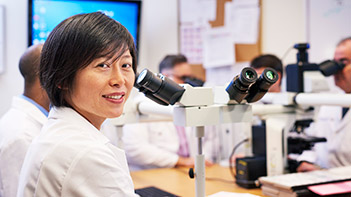Anatomic Pathology
About Anatomic Pathology at BIDMC
 The Division of Anatomic Pathology examines surgical specimens and biopsies while also performing cytopathic examination of direct smears, body fluids and fine-needle aspirates. The division also performs examination of specimens including immunohistochemistry and electron microscopy as well as performs autopsies.
The Division of Anatomic Pathology examines surgical specimens and biopsies while also performing cytopathic examination of direct smears, body fluids and fine-needle aspirates. The division also performs examination of specimens including immunohistochemistry and electron microscopy as well as performs autopsies.
Surgical Pathology renders pathologic diagnoses on tissues removed from patients. It includes the immediate evaluation of specimens in the operating room by frozen section to assist surgeons in making important intraoperative decisions.
In addition to routine assessment by hematoxylin-and-eosin staining of paraffin-embedded sections, specimens are also evaluated by special techniques as appropriate. Tissue removed at surgery is examined grossly and portions are fixed, dehydrated, cleared, embedded, sectioned, mounted on slides, and stained in preparation for microscopic examination.
Histology Laboratory
The histology laboratory employs a wide variety of special stains and maintains over 200 specific antibodies for immunohistochemistry on paraffin-embedded and frozen tissue sections. Immunohistochemistry is routinely performed on more than 10,000 specimens per year. Our electron microscopy unit examines approximately 200 samples each year.
Multidisciplinary and Coordinated Approach
Our surgical pathologists have joined with colleagues in several clinical departments to form multidisciplinary clinics that are designed to optimize the care of patients with various types of malignancy.
Collaborations with Breast Clinic and Cutaneous Oncology
Examples include collaborations with the breast clinic and cutaneous oncology. In these forums, clinicians, radiologists and pathologists join together to provide seamless care for all new patients as well as for patients whose initial diagnostic procedures were performed elsewhere. In this manner, we are integrating pathology into a coordinated approach that significantly enhances patient care.
Cytopathology is the practice of pathology that makes diagnoses based on the microscopic examination of individual cells, mostly obtained through non-invasive and minimally invasive procedures.
The 35,000+ cytopathology specimens we examine annually include:
- 25,000 gynecologic specimens
- More than 10,000 non-gynecologic specimens, including fine needle aspiration (FNA) specimens
FNA Performance
We provide a fine needle aspiration service on request, where the cytopathology faculty and cytopathology fellows perform FNA procedures and can render immediate diagnoses on superficial palpable nodules.
On-site Specimen Adequacy Evaluations
In addition to processing and interpreting cytologic specimens, we provide on-site specimen adequacy evaluations for radiologic procedures, increasing diagnostic yield and ensuring proper specimen triaging.
Gynecologic Specimens
For gynecologic specimens, our laboratory interprets both conventional smears and liquid-based preparations (ThinPrep). The screening of the liquid-based preparations is computer assisted using the Hologic ThinPrep Imaging System.
Autopsy Pathology helps determine the cause and manner of death of an individual. We perform ~100 postmortem examinations per year representing ~20% of the deaths at the hospital.
Teaching Tools for Residents and Medical Students
Cases serve as teaching tools for residents and medical students to enhance the understanding of human disease and promote communication between subspecialties.
Accurate Death Statistics, Clinical Diagnosis and Patient Care
Autopsies provide a basis for accurate death statistics and assess the accuracy of clinical diagnosis and quality of care (reviewed in Cameron et al., Br Med J 281:955, 1980; Goldman et al., N Engl J Med 308:1000, 1983; Landefeld et al., N Engl J Med 318:1249, 1988).
Autopsy Service Coverage
Postmortem examinations are performed Monday through Saturday between 8:00 a.m. and 3:00 p.m. Limited autopsies (brain only) may be started later. Autopsies are encouraged on BIDMC patients in Hospice or nursing care facilities.
For Instructions, Please Contact the Pathology Department at 617-667-5759
Answers to Common Questions About Autopsy
When someone dies, doctors may ask the family for permission to perform an autopsy. For many families, it is difficult to face this decision during a time of loss and grief. Sometimes, families are not sure why the autopsy is needed, or they have questions about what will happen during the procedure. Families may be concerned about how the procedure might affect funeral arrangements or cultural traditions. To read the answer to some of the common questions that arise about autopsy, click below.
